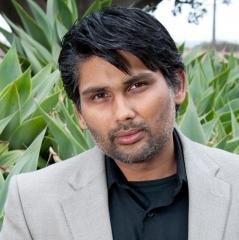Seminar on "Micro and Nanoscale Coulter Counters"
Events | Mechanical Engineering
Seminar on "Micro and Nanoscale Coulter Counters"
October 3, 2016 8:30 AM

Speaker
Professor Luke Theogarajan
Location
ESB 1001
Type
Seminar
Coulter counters are simple devices routinely used to count cells based on the resistive pulse technique. The power of the technique arises from the ability to transduce volumetric changes to an electronic signature. The resistive pulse technique is based on the blockage of ions passing through a pore in an insulating material separating two ionic reservoirs by the cell (or analyte). The amplitude and duration of the ionic current can be used to infer the shape of the object. In this talk I will highlight my lab’s use of the coulter counter technique in deciphering the properties of cells and DNA. I will start by describing our recent work in undulating microfluidic channels to classify tumor cells. Following this I will talk about the use of the resistive pulse technique at the nanoscale for analyzing single molecules, such as DNA. At the nanoscale coulter counters can be developed using both solid-state (e.g. silicon based materials) and soft-materials (such as proteins). I will talk about the advantages and disadvantages of both methods and the recent work done in my lab using both approaches.
Bio: Luke Theogarajan is currently a Professor at the University of California, Santa Barbara in Electrical and Computer Engineering. He received his Ph.D. degree in Electrical Engineering and Computer Science at the Massachusetts Institute of Technology in 2007. Before starting his PhD he worked for intel for 5 years where he was part of the Pentium 4 design team. He has published both in the field of electrical engineering and polymer chemistry and holds 4 patents. Professor Theogarajan is also a 2010 NIH New Innovator Award recipient and a 2011 NSF Career Award recipient. He has been awarded the Northrop Grumman Excellence in teaching award in 2011 and the outstanding faculty member in EE for the years 2009, 2010, 2011, 2012, and 2013. Professor Theogarajan's research interest lie at the interface of materials, biology and engineering. His group currently works on biosensors, polymer chemistry, microscope patterning of neurons for studying simple neural networks, electronics for photonics and novel proteins for neural recording.